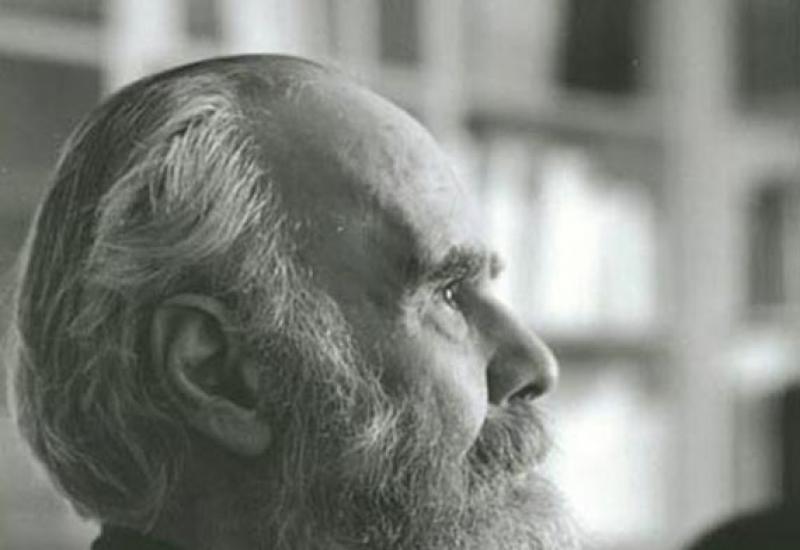Beria and Yezhov as minister. Nikolai Yezhov. From clerk to commissioner
Continuing the topic started here
Who is this? Of course you recognized him.
One of the most odious and sinister Stalinist people's commissars, all-powerful, all-powerful, terrible and cruel. Uncompromising and consistent. Faithful Leninist and Stalinist!
In the flash of lightning you became familiar to us,
Yezhov, a keen-eyed and intelligent People's Commissar.
Great Lenin's words of wisdom
Raised the hero Yezhov for battle.
Great Stalin's fiery call
Yezhov heard with all his heart, with all his blood!
Thank you, Yezhov, for raising the alarm,
You stand guard over the country and the leader.
(Dzhambul Dzhabayev, translation from Kyrgyz)
Let's not retell the biography of this man, let's talk about his... wife.
Evgenia Solomonovna Ezhova
(née Feigenberg (Faigenberg); Khayutina by her first husband, was born into the family of a rabbi.
In September 1929, in Sochi, she met N.I. Yezhov. In 1931 she married him.
Beautiful Shulamith)) Oh, how many people wanted to hug and kiss her...
Here she is with her daughter.
But is it really possible to imagine this??? Wife of the People's Commissar of the NKVD!!!
With his name, children learned to read and write...
It's scary! But it turns out that not everyone... It turns out that many famous people have been in her bed. Writers Babel, Koltsov, polar explorer Schmidt, pilot Chkalov, writer Sholokhov.
Reports on this topic have been preserved. For example, this one
People's Commissar of Internal Affairs of the USSR
Commissioner of State
first rank security
Comrade Beria
In accordance with your order to control the writer Sholokhov under the letter “N”, I report: in the last days of May, an order was received to take control of Sholokhov, who had arrived in Moscow, and who was staying with his family at the National Hotel in room 215. Control at the specified facility lasted from 3.06. to 06/11/38. Copies of reports are available.
Around mid-August, Sholokhov again arrived in Moscow and stayed at the same hotel. Since there was an order to enter the hotel rooms on your own during your free time and, if there was an interesting conversation, to take the necessary measures, the stenographer Korolev entered Sholokhov’s room and, recognizing him by his voice, told me whether it was necessary to control it. I immediately reported this to Alekhine , who ordered to continue control. Having appreciated Koroleva’s initiative, he ordered her to receive a bonus, for which a draft order was drawn up. On the second day, stenographer Yurevich took up duty, taking notes on the stay of comrade’s wife. Yezhov at Sholokhov.
Control over Sholokhov’s number continued for over ten more days, until his departure, and during the control, an intimate relationship between Sholokhov and the wife of Comrade was recorded. Yezhova.
Deputy head of the first department of the 2nd special department of the NKVD, state security lieutenant (Kuzmin)
December 12, 1938
How so? Why? Could the bloody People's Commissar endure such humiliation? Or maybe you weren’t particularly worried about this? It is difficult to imagine that such a person could forgive such a thing. He was a typical evil dwarf. His height is, as they say, a meter with a cap. And without a cap, to be precise - 151 cm. Even against the background of not tall Stalin and Molotov, whose height was 166 cm, he looked like a midget
But, powerful midget!
There may actually be one answer. He wasn't interested in his wife! So what was the all-powerful People's Commissar interested in?
Statement from the arrested N.I. Ezhov to the Investigative Unit of the NKVD of the USSR
I consider it necessary to bring to the attention of the investigative authorities a number of new facts characterizing my moral and everyday decomposition. We are talking about my old vice - pederasty.
This began in my early youth when I was apprenticed to a tailor. From about the age of 15 to 16, I had several cases of perverted sexual acts with my peers, students of the same tailoring workshop. This vice was renewed in the old tsarist army in a front-line situation. In addition to one chance connection with one of the soldiers of our company, I had a connection with a certain Filatov, my friend in Leningrad with whom we served in the same regiment. The relationship was mutually active, that is, the “woman” was either one side or the other. Subsequently, Filatov was killed at the front.
Twenty-year-old Nikolai Yezhov with an army colleague (Yezhov is on the right).
In 1919, I was appointed commissar of the 2nd base of radiotelegraph formations. My secretary was a certain Antoshin. I know that in 1937 he was still in Moscow and worked somewhere as the head of a radio station. He himself is a radio engineer. In 1919, I had a mutually active pederastic relationship with this same Antoshin.
In 1924 I worked in Semipalatinsk. My old friend Dementyev went there with me. With him, in 1924, I also had several cases of active pederasty only on my part.
In 1925, in the city of Orenburg, I established a pederastic relationship with a certain Boyarsky, then the chairman of the Kazakh regional trade union council. Now, as far as I know, he works as the director of an art theater in Moscow. The connection was mutually active.
Then he and I had just arrived in Orenburg and lived in the same hotel. The connection was short, until the arrival of his wife, who arrived soon after.
In the same 1925, the capital of Kazakhstan was transferred from Orenburg to Kzyl-Orda, where I also went to work. Soon F.I. Goloshchekin arrived there as secretary of the regional committee (now he works as the Head of the Warbiter). He arrived as a bachelor, without a wife, and I also lived as a bachelor. Before I left for Moscow (about 2 months), I actually moved into his apartment and often spent the night there. I also soon established a pederastic relationship with him, which continued periodically until my departure. The connection with him was, like the previous ones, mutually active.
(Goloshchekin??? And he? Philip Isaevich Goloshchekin. In publications about the execution of the royal family, he is often mentioned: being the Ural regional military commissar, he was actually the main organizer of both the execution and the hiding of the bodies of the dead. In principle, before becoming a Bolshevik, worked as a dental technician in Vitebsk. Since 1905 - already in the capitals, forging a revolution. Was acquainted with V.I. Lenin. After the liquidation of the royal family, he was promoted: first, he was the chairman of the Samara provincial executive committee, then the first secretary of the Central Committee of the Communist Party of Kazakhstan, where with fire and sword achieved the transfer of nomads to a sedentary lifestyle.
He ended his career as the Chief State Arbiter of the USSR. In this position, he was arrested by Beria, placed in a pre-trial detention center, where he spent two years, and during the German offensive on Moscow in 1941, along with other VIP prisoners, he was evacuated to Kuibyshev and only shot there.)
In 1938, there were two cases of pederastic connections with Dementyev, with whom I had this connection, as I said above, back in 1924. The connection was in Moscow in the fall of 1938 in my apartment after I was removed from the post of People's Commissar for Internal Affairs. Dementyev lived with me then for about two months.
Somewhat later, also in 1938, there were two cases of pederasty between me and Konstantinov. I have known Konstantinov since 1918 in the army. He worked with me until 1921. After 1921, we almost never met. In 1938, at my invitation, he began to often visit my apartment and was at the dacha two or three times. I came twice with my wife, the rest of the visits were without wives. He often stayed overnight with me. As I said above, at the same time I had two cases of pederasty with him. The connection was mutually active. It should also be said that during one of his visits to my apartment, together with my wife, I had sexual intercourse with her.
All this was usually accompanied by drinking.
I give this information to the investigative authorities as an additional touch characterizing my moral and everyday decomposition.
Central Election Commission FSB. F. 3-os. Op.6. D.3. L.420-423.
That's what he was, the glorious head of the NKVD, Stalin's eagle!
What’s interesting is that, in addition to accusations of preparing a coup and terrorist attacks against the country’s top leadership, there was also an accusation of sodomy, and it sounded like this:
“Yezhov committed acts of sodomy “acting for anti-Soviet and selfish purposes””
This is how they were, the all-powerful People's Commissars...
In Soviet historiography since the 1960s, the “Great Terror” of 1937-1938 was invariably associated with the name Lavrentiy Beria. However, “the man in the ominously glittering pince-nez,” for all his sins, does not deserve such an honor. Beria’s name is firmly tied to the “Great Terror” Nikita Khrushchev. Having won the struggle for power against the former all-powerful head of the NKVD, Khrushchev did not limit himself to the physical elimination of his competitor, but also contributed to the creation of a completely demonic historical portrait of the defeated enemy.
Thanks to this, the man who really was the main executor of the “Great Terror” remained in the shadows - Nikolay Ezhov.
This person is one of the most famous and at the same time mysterious of the high-ranking persons of the Soviet era. This is largely due to the fact that Yezhov himself provided data in his questionnaires, sometimes very far from reality.
From clerk to commissioner
He was born on May 1, 1895 in St. Petersburg in the family of a Russian foundry worker. According to another version, his place of birth was the village of Veivery, Mariampolsky district, Suvalsk province (the territory of modern Lithuania). His father, according to this version, was a retired soldier from the Tula province, and his mother was a Lithuanian peasant woman. He appeared in St. Petersburg in 1906, when the boy’s parents sent the boy to a relative to study tailoring.
In 1915, Yezhov volunteered for the front, but did not win military laurels - he was slightly wounded, fell ill, and then was completely declared unfit for combat service due to his very short stature (151 cm). Before the revolution, Yezhov served as a clerk in a rear artillery workshop.
In his questionnaires, Yezhov wrote that he joined the Bolshevik Party in the spring of 1917, but in the Vitebsk archives there was information that in August 1917 he joined the local organization of the RSDLP, which consisted not only of Bolsheviks, but also of Menshevik internationalists.
Be that as it may, Yezhov did not take part in the October Revolution and subsequent events - after another illness, he received a long leave and went to his parents, who had moved to the Tver province. In 1918, he got a job at a glass factory in Vyshny Volochyok.
Yezhov was drafted into the Red Army in 1919 and sent to the Saratov base of radio formations, where he served first as a private and then as a census taker for the commissar of the base administration. In April 1921, Yezhov became commissar of the base and began to advance along the party line.
Vyacheslav Molotov (left), Georgy Ordzhonikidze (second from left), Nikolai Yezhov (second from right) and Anastas Mikoyan (right) in the presidium at the ceremonial meeting dedicated to the launch of the first stage of the Moscow metro. 1935 Photo: RIA Novosti
"He doesn't know how to stop"
His career was helped by marriage. Married in July 1921 to Antonina Titova, who was transferred to work in Moscow, Yezhov followed his wife to the capital.
A short, but efficient and diligent person, he established himself well in the capital, and they began to send him to work in high party positions in the district and regional committees of the CPSU (b). Having traveled around Kyrgyzstan and Kazakhstan, during the XIV Party Congress, Yezhov met high-ranking employee of the apparatus of the Central Committee of the All-Union Communist Party (Bolsheviks) Ivan Moskvin. The party apparatchik drew attention to the executive officer and in 1927, being the head of the Organizational and Preparatory Department of the Central Committee of the All-Union Communist Party of Bolsheviks, invited Yezhov to the position of instructor.
“I don’t know a more ideal worker than Yezhov. Or rather, not a worker, but a performer. Having entrusted something to him, you don’t have to check it and be sure that he will do everything. Yezhov has only one, albeit significant, drawback: he does not know how to stop. Sometimes there are situations when it is impossible to do something, you need to stop. Yezhov doesn’t stop. And sometimes you have to keep an eye on him in order to stop him in time...” Ivan Moskvin later wrote about his protégé. This is perhaps the most accurate and comprehensive description of Yezhov.
Ivan Mikhailovich Moskvin will be shot on November 27, 1937, when People's Commissar Yezhov will spin the flywheel of the “great terror” with might and main.
Cleaning specialist
The executive officer continued his career growth. In 1930, when Moskvin left for promotion, Yezhov headed the Organizational and Preparatory Department of the Central Committee of the All-Union Communist Party of Bolsheviks and met Joseph Stalin, who quickly appreciated the business skills of the operator.

From left to right - Kliment Voroshilov, Vyacheslav Molotov, Joseph Stalin and Nikolai Yezhov on the Moscow-Volga canal. Photo: www.russianlook.com
Yezhov diligently pursued the Stalinist personnel course. In 1933-1934, he was included in the Central Commission of the All-Union Communist Party (Bolsheviks) to “cleanse” the party. In February 1935, he became chairman of the Party Control Commission under the Central Committee of the All-Union Communist Party of Bolsheviks. This structure was responsible for checking the activities of party members and determining whether their moral character corresponded to the high title of communist. Yezhov receives the authority to decide the party fate of the old Bolsheviks, opponents of the Stalinist course.
At this point, the intra-party confrontation is rapidly approaching its final phase. The revolutionaries who went through the Civil War were accustomed to relying not on the power of words, but on the “rightness of arms” in the struggle.

Nikolai Yezhov in 1937. Photo: Commons.wikimedia.org
The first high-profile trials of party oppositionists, organized by the chief of the NKVD Genrikh Yagoda, supporters of the Stalinist general line are no longer satisfied - too slow and selective. The issue needs to be resolved quickly and fundamentally.
After the trial Kamenev And Zinoviev in August 1936, Stalin decided that at this stage the head of the NKVD needed an excellent performer capable of coping with a large-scale task.
On September 26, 1936, Nikolai Yezhov became People's Commissar of Internal Affairs of the USSR. His predecessor, Genrikh Yagoda, is accused of “anti-state crimes,” and at the so-called Third Moscow Trial he will be in the dock.
Genrikh Yagoda was sentenced to death and executed in Lubyanka prison on March 15, 1938.
The repressions began with the security officers
Yezhov began his activities as head of the NKVD with a “purge” in the ranks of his subordinates. On March 2, 1937, in a report at the plenum of the Central Committee of the All-Union Communist Party of Bolsheviks, he sharply criticized his subordinates, pointing out failures in intelligence and investigative work. The Plenum approved the report and instructed Yezhov to restore order in the NKVD. Of the state security employees from October 1, 1936 to August 15, 1938, 2,273 people were arrested. Yezhov himself later said that 14,000 security officers were “purged.”
The wheel of the “Great Terror” began to turn. Initially, party bodies pointed to the “enemies”, and the NKVD carried out only the mission of executors. Soon, Yezhov and his subordinates began to take the initiative, themselves identifying “counter-revolutionary elements” that were outside the purview of the party.
On July 30, 1937, People's Commissar Yezhov signed the Politburo-approved order of the NKVD of the USSR No. 00447 “On the operation to repress former kulaks, criminals and other anti-Soviet elements,” which provided for the creation of “operational troikas” of the NKVD to expedite the consideration of cases.
It was with this order that what is now known as the “Great Terror” began. In 1937-1938, 1,344,923 people were convicted for political reasons, of which 681,692 were sentenced to capital punishment.
Russian history has never known anything like this. At the first stage, party and government officials who did not share Stalin’s line fell into the millstones of terror; at the second stage, everyone who was labeled a “counter-revolutionary” was arrested and convicted. At subsequent stages, the “Great Terror” turned into a way to move up the career ladder and settle personal scores, when denunciations began to be written against neighbors, work colleagues, and simply unwanted individuals for one reason or another.
“I praise Batyr Yezhov”
Soviet propaganda, which glorified the valiant NKVD workers who “saved the country from “fascist-Trotskyists”,” created an atmosphere of hysteria in society.
Yezhov worked tirelessly. From January 1937 to August 1938, he sent Stalin about 15,000 special messages with reports of arrests, punitive operations, requests for authorization of certain repressive actions, and interrogation reports.
During this period, the only person who communicated with Stalin more often than him was Vyacheslav Mikhailovich Molotov - head of the Soviet government.
The Soviet press praised Yezhov and his “iron gloves” with which he crushed the “counter-revolutionary bastards.” In terms of popularity in the country, this one and a half meter tall man was second only to the leader himself.
Kazakh akyn Dzhambul Dzhabayev composed “The Song of Batyr Yezhov,” which contained the following lines:
“I praise the hero who sees and hears,
How, crawling towards us in the dark, the enemy breathes.
I praise the hero's courage and strength
With the eyes of an eagle and an iron hand.
I praise the hero Yezhov, who,
Having opened it, he destroyed the snake holes,
And where the alarming lightning flies,
He stood as a sentry on the Soviet border.”
By the summer of 1938, many in the Central Committee of the All-Union Communist Party of Bolsheviks remembered the words of the unfortunate Ivan Moskvin: “Yezhov does not know how to stop.” There was no longer talk of any “socialist legality”: signals were received from all sides that NKVD officers were using torture, fabricating cases against people who had nothing to do with the counter-revolution.
Yezhov not only does not stop his employees, but encourages them to act even tougher and more actively. Moreover, they said that the head of the NKVD was personally involved in the interrogation and torture of those arrested.
The Moor did his job...
Yezhov crossed all possible boundaries. The performer felt like the arbiter of human destinies. Even the people closest to Stalin were openly afraid of him. It seemed that just a little more, and the NKVD would push the party away from the levers of power.
Stalin himself later told his comrades that, having once called Yezhov, he discovered that the head of the NKVD was completely drunk. Perhaps Joseph Vissarionovich made up this story, but the fact is a fact - Yezhov could not stop.
In August 1938, Lavrentiy Beria was appointed Yezhov's first deputy for the NKVD and head of the Main Directorate of State Security, replacing the People's Commissar in this post. Mikhail Frinovsky.
Yezhov understood perfectly well what this meant, but he could no longer change anything. In November 1938, at a meeting of the Politburo, a letter was considered Head of the NKVD department for the Ivanovo region Viktor Zhuravlev, who accused Yezhov of omissions in his work and ignoring signals about the activities of “enemies of the people.”
Zhuravlev's denunciation became an excellent reason to remove Yezhov. The People's Commissar did not resist, admitted mistakes and on November 23, 1938 submitted his resignation. On December 9, 1938, Pravda reported that Yezhov was removed from his duties as People's Commissar of Internal Affairs, with one more post retained for him - People's Commissar of Water Transport.

N. I. Ezhov and I. V. Stalin. Photo: Commons.wikimedia.org
In January 1939, Yezhov attended a ceremonial meeting dedicated to the 15th anniversary of Lenin’s death, but was no longer elected as a delegate to the XVIII Congress of the CPSU(b).
With the arrival of Lavrentiy Beria as head of the NKVD, the “Great Terror” ended. Of course, no one thought of recognizing it as erroneous, but the activities of Yezhov and his associates were recognized as erroneous. According to various estimates, after the arrival of Beria, from prisons and camps, from 200 to 300 thousand people were released who were found illegally convicted or whose cases were terminated for lack of evidence of a crime.
Among the extensive charges brought against him, the main one was “preparation of a coup and terrorist attacks against the top leaders of the USSR.” The icing on the cake of accusations was the article for sodomy - Yezhov himself admitted to homosexual inclinations.
At the trial, Yezhov denied preparing terrorist attacks, stating: “During the preliminary investigation, I said that I was not a spy, I was not a terrorist, but they did not believe me and severely beat me. During the twenty-five years of my party life I honestly fought with enemies and destroyed enemies.”
However, what Yezhov said was no longer important. On February 3, 1940, by the verdict of the Military Collegium of the Supreme Court of the USSR, he was sentenced to death. The sentence was carried out the next day, and the corpse was burned in the crematorium on the territory of the Donskoy Monastery.
The arrest and execution of Yezhov was not reported in the Soviet press at all - he simply disappeared. The fact that he was no longer a hero of the Land of the Soviets could only be understood from the reverse renaming of the streets and settlements named in his honor.
Because of this, the most incredible rumors circulated about Yezhov, to the point that he fled to Nazi Germany and serves as an adviser Hitler.
Nikolai Yezhov is not the most popular figure among Soviet-era figures. But he was suddenly remembered in 2008, after his election to the post US President Barack Obama. It turned out that the facial features of the new owner of the White House are surprisingly similar to the facial features of Nikolai Yezhov. Such is the irony of fate...
Illustration copyright Unknown
75 years ago, on April 10, 1939, former People's Commissar of Internal Affairs of the USSR Nikolai Yezhov was arrested, whom the poet Dzhambul called "Stalin's hero" and his victims - "bloody dwarf."
Few political figures, especially those who did not head the state, gave their name to the era. Nikolai Yezhov is one of them.
According to Alexander Tvardovsky, Stalin “knew how to transfer a heap of his mistakes to someone else’s account.” The mass repressions of 1937-1938 remained in history as the Yezhovshchina, although it would be more fair to talk about Stalinism.
"The fiend of the nomenklatura"
Unlike the professional security officers Menzhinsky, Yagoda and Beria, Yezhov was a party worker.
Having completed three years of primary school, he turned out to be the least educated leader of the Soviet/Russian intelligence services in history.
He was called a dwarf because of his height - only 154 centimeters.
Nikolai Yezhov was born on April 22 (May 1), 1895 in the village of Veivery, Mariampolsky district, Suwalki province (now Lithuania).
According to his biographer Alexei Pavlyukov, the father of the future People's Commissar Ivan Yezhov served in the police. Subsequently, Yezhov claimed that he was a hereditary proletarian, the son of a worker at the Putilov factory, and he himself managed to work there as a mechanic, although in reality he studied privately in tailoring.
He also, to put it mildly, reported incorrect information about the time of his joining the Bolsheviks: he indicated March 1917 in his autobiographies, whereas, according to the documents of the Vitebsk city organization of the RSDLP, this happened on August 3.
In June 1915, Yezhov volunteered for the army, and after being slightly wounded, he was transferred to the position of clerk. He was drafted into the Red Army in April 1919, and again served as a clerk at the school of military radio operators in Saratov. Six months later he became a school commissioner.
Yezhov's career took off after his transfer to Moscow in September 1921. Within five months, the Organizing Bureau of the Central Committee sent him as secretary of the provincial committee to the Mari Autonomous Region.
At that time, narrow-minded wits nicknamed Stalin “Comrade Kartotekov.” While the rest of the “leaders,” reveling in themselves, talked about the world revolution, Stalin and his employees spent all day fiddling with the cards that they had opened for thousands of “promising party members.”
Yezhov was distinguished by his natural intelligence and worker-peasant practical mind, instinct, and ability to navigate. And endless devotion to Stalin. Not ostentatious. Sincere! Vladimir Nekrasov, historian
In 1922 alone, the Secretariat of the Central Committee and the Accounting and Distribution Department created by Stalin made more than 10 thousand appointments in the party and state apparatus, and replaced 42 secretaries of provincial committees.
The nomenclature workers at that time did not stay in one place for a long time. Yezhov worked in Kazakhstan and Kyrgyzstan; in December 1925, at the XIV Congress of the All-Union Communist Party (Bolsheviks), he met Ivan Moskvin, who two months later headed the Organizational and Preparatory Department of the Central Committee and took Yezhov to his place as an instructor.
In November 1930, Yezhov took Moskvin's place. According to available data, his personal acquaintance with Stalin dates back to this time.
“I don’t know a more ideal worker than Yezhov. Or rather, not a worker, but a performer. Having entrusted him with something, you don’t have to check and be sure that he will do everything. Yezhov has only one drawback: he doesn’t know how to stop. Sometimes you have to watch behind him in order to stop him in time,” Moskvin told his son-in-law Lev Razgon, who survived the Gulag and became a famous writer.
Moskvin came home every day for lunch and often brought Yezhov with him. The patron's wife called him "little sparrow" and tried to feed him better.
In 1937, Moskvin received “10 years without the right to correspondence.” Having superimposed the standard resolution on the report: “Arrest,” Yezhov added: “And his wife too.”
Sofya Moskvina was accused of trying to poison Yezhov on instructions from British intelligence and was shot. If not for the intervention of a former friend at home, I would have gotten away with being sent to a camp.
Yezhov became involved in KGB affairs after the murder of Kirov.
“Yezhov called me to his dacha. The meeting was of a conspiratorial nature. Yezhov conveyed Stalin’s instructions on the mistakes made by the investigation in the case of the Trotskyist center, and instructed to take measures to open the Trotskyist center, identify the obviously undisclosed terrorist gang and Trotsky’s personal role in this case ", one of his deputies, Yakov Agranov, reported to Yagoda.
The dream of a world revolution left with Trotsky, and even the Boss himself could not afford to offer the idea of universal equality and brotherhood to the village lumpen who had risen from rags to riches. All he could do was shoot some “red boyars” to scare others Mark Solonin, historian
Until 1937, Yezhov did not give the impression of a demonic personality. He was sociable, gallant with the ladies, loved Yesenin's poems, willingly participated in feasts and danced the "Russian".
The writer Yuri Dombrovsky, whose acquaintances knew Yezhov personally, argued that among them “there was not a single one who would say anything bad about Yezhov; he was a sympathetic, humane, gentle, tactful person.”
Nadezhda Mandelstam, who met Yezhov in Sukhumi in the summer of 1930, recalled him as a “modest and rather pleasant person” who gave her roses and often drove her and her husband in his car.
The more surprising is the metamorphosis that happened to him.
“Yezhov is deservedly considered the bloodiest executioner in the history of Russia. But any Stalinist appointee would have done the same thing in his place. Yezhov was not a fiend of hell, he was a fiend of the nomenklatura,” wrote historian Mikhail Voslensky.
Great Terror
During the Soviet era, the opinion was cultivated that the crimes of the regime were entirely limited to the notorious year 1937, and before and after everything was fine. Under Khrushchev, it was unofficially suggested that the leader had simply suffered from a temporary cloud of reason.
The idea was persistently imposed that Stalin's only guilt was the repressions against the nomenklatura.
Stalin hit his own people, the veterans of the party and the revolution! For this we condemn him! From Nikita Khrushchev’s report at the 20th Congress of the CPSU
Alexander Solzhenitsyn was the first to say that the terror from 1918 to 1953 did not stop for a day. In his opinion, the only difference was that in 1937 it was the turn of high-ranking communists, and it was their descendants who made a fuss about the “damned nine hundred.” At the same time, historical justice was done to the “Leninist Guard,” although they were executed not by those who had the moral right to do so, and not for what they should have done.
Now we can say that he was partly right. The events, at the instigation of the British historian Robert Conquest, known as the “Great Terror” were nevertheless exceptional.
Of the 799,455 people executed from 1921 to 1953 for political reasons, 681,692 people were shot in 1937-1938, with about a hundred ordinary people per “faithful Leninist.” If in other periods approximately every twentieth of those arrested was sentenced to death, and the rest were sent to the Gulag, then during the Great Terror - almost every second.
In autocratic Russia, from 1825 to 1905, 625 death sentences were imposed, of which 191 were carried out. During the suppression of the revolution of 1905-1907, about 2,200 people were hanged and shot.
It was in 1937 that the most severe torture and beatings of those under investigation became widespread.
Probably, even representatives of the nomenklatura had questions in this regard, since Stalin considered it necessary on January 10, 1939 to send an encrypted telegram to the leaders of regional party organizations and NKVD departments, which said: “The use of physical force in the practice of the NKVD has been allowed since 1937. permission of the Central Committee of the All-Union Communist Party (Bolsheviks). The Central Committee of the All-Union Communist Party (Bolsheviks) believes that the method of physical influence must necessarily be used in the future."
For obvious reasons, the descendants of thousands of repressed peasants will never attract as much attention to the tragedy of their families as the descendants of one repressed member of the Politburo Mark Solonin, historian
In addition to the 680 thousand executed, about 115 thousand people “died while under investigation,” in other words, under torture. Among them was, for example, Marshal Vasily Blucher, who did not receive his bullet.
“We noticed gray-brown stains on several pages of the protocol. We ordered a forensic chemical examination. It turned out to be blood,” recalled Deputy Chief Military Prosecutor Boris Viktorov, who was involved in the review of the “Tukhachevsky case” in the 1950s.
One of the investigators in 1937 proudly told his colleagues how Yezhov came into his office and asked whether the arrested man would confess. “When I said no, Nikolai Ivanovich turned around and bam in his face!”
Triple purpose
Firstly, the blow was dealt to the “Leninist guard”, in whose eyes Stalin, despite all the praise, remained not a god-like leader, but first among equals.
Having committed horrific atrocities against the people, these people have become accustomed to relative freedom, inviolability and the right to their own opinion.
The Vladimir prince Andrei Bogolyubsky, considered the first “autocrat” in Rus', was condemned by the boyars (and subsequently killed) because he wanted to make them “helpers.” Stalin set himself the same task, so that, in the famous expression of Ivan the Terrible, everyone would be like grass, and he alone would be like a mighty oak.
The French Communist Party was called after the war “the party of the executed.” But this name is especially suitable for Lenin’s Bolshevik Party. Mikhail Voslensky, historian
If in 1930, among the secretaries of regional committees and republican Central Committees, 69% had pre-revolutionary party experience, then in 1939, 80.5% of them joined the party after Lenin’s death.
The XVII Congress of the All-Union Communist Party (Bolsheviks), held in 1934 and officially called the “Congress of the Winners,” turned out to be a “Congress of the doomed”: 1,108 of 1,956 delegates and 97 of 139 elected members of the Central Committee were executed, and five more committed suicide.
Secondly, Stalin, according to historians, decided to “cleanse the country” before the big war: after the establishment of an illegitimate dictatorship, the confiscation of private property, the abolition of all political and personal freedoms, the Holodomor and the mockery of religion, too many people were formed who were cruelly offended by the Soviet regime.
“It was necessary to deliver a pre-emptive strike against a potential fifth column, insuring the existing regime in the country from possible shocks in wartime,” writes Alexey Pavlyukov.
“It was a kind of summing up. A significant part of the country’s population was among the offended. They were afraid. Stalin and his entourage wanted to protect themselves in advance,” believes historian Leonid Mlechin.
“Fear of the impending war was the main driver of repression. They believed that it was necessary to remove everyone who raised doubts,” Molotov’s grandson Vyacheslav Nikonov told Mlechin.
A number of researchers are confident that Stalin was not afraid of war, but deliberately and carefully prepared for it, but in this case it does not matter.
Judging by the results, the terror did not achieve its goal. According to minimal estimates, at least 900 thousand Soviet citizens served the enemy with weapons in their hands during the war.
Our contemporaries see this situation differently. Some argue that Stalin arranged 1937 correctly, and also showed excessive softness and did not destroy all his enemies. Others believe that he would have been better off shooting himself, and given the nature of the regime there were surprisingly few traitors.
The third task was to weld the nation together with iron discipline and fear, to force everyone to work hard for pennies, to do not what is profitable or pleasant, but what the state needs.
The dictatorship of the proletariat has turned into a dictatorship over the people, all of whom have been turned into the proletariat in the most literal sense of the word - deprived of property and rights, doing work at the discretion of the owner and receiving just enough not to die of hunger, or to die if the owner decides so. The technique was developed back in ancient times. The trick was different - to force the slaves to sing in chorus, and even with rapture: “I don’t know another country like this, where a person breathes so freely Igor Bunich, historian
In 1940, the USSR adopted such savage anti-labor legislation as the most odious right-wing dictatorships had never known.
The decree of the Presidium of the Supreme Council of June 26 “On the prohibition of unauthorized departure from enterprises and institutions”, following the collective farmers deprived of their passports, turned the majority of the country’s population into serfs and introduced criminal liability for being late for work for more than 20 minutes.
During the seven pre-war years, about six million people were sent to camps and prisons in the USSR. “Enemies of the people” and criminals among them were approximately 25%, and 57% were imprisoned for being late, “screwing up” a part, failure to comply with the mandatory norm of workdays and other similar “crimes.”
The decree of October 2 “On State Labor Reserves” made tuition paid in senior secondary schools, and for low-income children from the age of 14, it provided for “factory training” in combination with the fulfillment of adult production standards. Sentence to the FZU was officially called “conscription,” and for escaping from there they were sent to camps.
According to historian Igor Bunich, after 1937 Stalin created a kind of masterpiece state: everyone was in business, and no one dared to make a word.
"Nice job"
The party that Lenin created did not suit Stalin at all. A loud, shaggy-bearded gang in leather jackets, greedy and always arguing with the leadership, constantly dreaming of moving the center of the world revolution from such an uncultured and dirty place as Moscow to Berlin or Paris, where they went under various pretexts two or three times a year - such the party had to leave the stage, and leave quickly. Stalin's nomenklatura was placed within a different framework. Raised by a well-thought-out system of privileges to a standard of living unthinkable for the people, having virtually unlimited power over these people, she was well aware of her own insignificance. Igor Bunich, historian
In February 1935, Yezhov was appointed one of the three secretaries of the Central Committee, responsible for organizational and personnel work, and chairman of the Party Control Commission, from that moment on, second only to Molotov in the number of meetings with Stalin.
His appointment as People's Commissar of Internal Affairs on September 26, 1936 was formally a demotion for him and was due to the special role assigned to him by Stalin.
According to historians, the former KGB elite believed that the main work had already been done and they could slow down. Yezhov was called upon to change these sentiments.
Back on December 1, 1934, after the murder of Kirov, the Presidium of the Central Executive Committee of the USSR adopted a resolution according to which cases “on the preparation or commission of terrorist acts” were to be investigated “in an expedited manner”, and death sentences were to be carried out immediately without the right of appeal.
The fate of people began to be decided by “troikas,” often “in batches,” without the right to defense, and often in the absence of the accused.
Instead of the OGPU and the republican people's commissariats of internal affairs, the union NKVD was formed.
Stalin, however, considered the creator of the Gulag and the organizer of cases against Lenin’s former comrades, Genrikh Yagoda, to be insufficiently energetic and decisive. He retained the remnants of reverence for the “old guard”; at least, he did not want to torture them.
On September 25, 1936, Stalin, while vacationing in Sochi with Andrei Zhdanov, sent a telegram to members of the Politburo: “We consider it absolutely necessary and urgent to appoint Comrade Yezhov to the post of People’s Commissar for Internal Affairs. Yagoda clearly was not up to the task of exposing the Trotskyist-Zinoviev bloc "The OGPU was 4 years late in this matter."
The next day, Yezhov’s appointment took place.
At the first meeting with the leadership of the People's Commissariat, he showed two fists to those present: “Don’t look that I’m short. My hands are strong - Stalin’s. I will imprison and shoot everyone, regardless of rank and rank, who dares to slow down the deal with the enemies of the people.” .
Soon he wrote a memo to Stalin: “Many shortcomings have been revealed in the NKVD that cannot be tolerated any longer. Among the leadership of the security officers, a mood of complacency, complacency and bragging is increasingly ripening. Instead of drawing conclusions from the Trotskyist case and criticizing their own shortcomings, people dream only about orders for a solved case."
Yezhov said that he had carried out Stalin’s instructions and reviewed the lists of those arrested in recent cases: “A fairly impressive number will have to be shot. I think we need to do this and put an end to this scum once and for all.”
In February-March 1937, a plenum of the Central Committee of the All-Union Communist Party of Bolsheviks was held, which lasted a week and a half - longer than any other in history - and was almost entirely devoted to the fight against the “enemies of the people.” Most of its participants were soon repressed themselves, despite the fact that they unconditionally supported Stalin’s line.
For several months I don’t remember a case when any of the business executives or heads of the People’s Commissariats would call on their own initiative and say: “Comrade Yezhov, somehow such and such a person is suspicious to me.” Most often, when you raise the question of arresting a traitor, a Trotskyist, comrades, on the contrary, try to defend these people. From Yezhov’s speech at the February-March plenum of the Central Committee of the All-Union Communist Party of Bolsheviks
On May 22, the arrest of Marshal Tukhachevsky marked the beginning of a mass purge of the command corps.
On August 1, secret order of the NKVD No. 00447 came into force, which identified the “target group” for repression of former “kulaks”, “members of anti-Soviet parties”, “members of rebel, fascist, spy formations”, “Trotskyists”, “church members”.
The order established for all regions of the Soviet Union regulations on the number of arrested and “convicted in the first category.”
The document stated that “the investigation is carried out in a simplified and expedited manner,” and its main task is to identify all the connections of the arrested person.
75 million rubles were allocated for the operation.
Obedient tool
The first mass executions in pursuance of Yezhov’s order took place at the Butovo training ground in the Moscow region on August 8, 1937. In 1937-1938, about 20 thousand people were killed there alone.
Initially, it was planned to shoot 76 thousand and send 200 thousand people to the Gulag, but requests began to pour in from regional committee secretaries and heads of NKVD departments to “increase the limit.” According to available data, Stalin did not refuse anyone.
In the 1950s, there were rumors that at the corresponding address of the head of the Ukrainian party organization Nikita Khrushchev, he imposed a resolution: “Calm down, you fool!”, but there is no evidence of this.
In December, the NKVD reported preliminary results: 555,641 arrested and 553,362 convicted. Of these, 239,252 were sentenced to death (former kulaks - 105,124, criminals - 36,063, "other counter-revolutionary elements" - 78,237, without specifying the group - 19,828), 314,110 - to imprisonment in a camp or prison (former kulaks - 138,588, criminals - 75,950, “other counter-revolutionary elements” - 83,591, without specifying a group - 16,001).
In total, over 18 months, the NKVD arrested 1 million 548 thousand 366 people for political reasons. On average, one and a half thousand people were shot a day. In 1937, 93 thousand people were executed for “espionage” alone.
Many people believed that evil came from a little man who was called the “Stalinist People's Commissar.” In fact, it was the other way around. Of course, Yezhov tried, but it’s not about him Ilya Erenburg, writer
Stalin signed 383 lists of “first category sanctions,” containing 44,465 names. In just one day, December 12, 1938, Stalin and Molotov sent 3,167 people to their deaths.
On the next confession extracted by investigators, Stalin imposed a resolution: “The persons marked by me in the text with the letters “Ar.” should be arrested, if they have not already been arrested.” On the list submitted by Yezhov of people who are “being checked for arrest”: “Not to be checked, but to be arrested.”
Molotov wrote on the testimony of the old party member who did not satisfy him: “Beat, beat, beat.”
In 1937-1938, according to the “Log of Visits,” Yezhov visited the leader almost 290 times and spent a total of about 850 hours with him.
Georgiy Dimitrov wrote in his diary that at a banquet on November 7, 1937, Stalin said: “We will not only destroy all enemies, but we will also destroy their families, their entire family to the last generation.”
As Nikita Khrushchev wrote in his memoirs, Yezhov “understood that Stalin was using him as a bludgeon, and doused his conscience with vodka.”
At the ceremonial meeting in honor of the 20th anniversary of the Cheka-OGPU-NKVD in December 1937, Anastas Mikoyan made a report: “Learn from Comrade Yezhov, as he studied and is learning from Comrade Stalin. The NKVD has done a great job during this time!”
Scapegoat
Stalin affectionately called his close associate “Ezhevichka”, often invited him to the dacha and played chess with him.
On October 27, 1936, Yezhov was introduced to the Politburo as a candidate; on January 27, 1937, he received the new title of General Commissioner of State Security with marshal stars on his blue buttonholes; on July 17, he received the Order of Lenin. The city of Sulimov in the North Caucasus was renamed Yezhovo-Cherkessk.
“The People's Poet of Kazakhstan” Dzhambul composed a poem: “Yezhov waylaid all the poisonous snakes and smoked the reptiles out of their holes and dens!” The Kukryniksy published in Pravda the famous drawing “Hedgehog Gauntlets,” in which the People’s Commissar was strangling a three-headed hydra with a swastika at the end of its tail.
Master's love, especially the love of a dictator, is short-lived. The change of command had an obvious advantage for Stalin: responsibility for all the “excesses” and mistakes could be shifted to Yezhov and his people. And people saw how fair Stalin was, how difficult it was for him when there were so many enemies around Leonid Mlechin, historian
However, already at the beginning of 1938, Yezhov began to fall out of favor.
As former high-ranking security officer Mikhail Shrader testified, once after a drink at the dacha, the People's Commissar opened up with his subordinates: “All power is in our hands. We execute whoever we want, we pardon whoever we want. It is necessary that everyone, starting from the secretary of the regional committee, walk under you ".
According to researchers, Stalin did not like Yezhov’s attempts to publish a book under his own name that extolled his fight against “Zinovievism,” and to become part-time editor of the journal “Party Construction,” as well as his proposal to rename Moscow Stalinodar. The leader believed that the People's Commissar should mind his own business, and not self-promotion.
But the main reason for the disgrace was the famous phrase: “The Moor has done his job - the Moor can leave.”
The last time praise for Yezhov was heard from a high rostrum was from the lips of the Secretary of the Central Committee Andrei Zhdanov at a solemn meeting on the day of the next anniversary of Lenin’s death in January 1938.
On January 9, the Central Committee adopted a resolution “On the facts of improper dismissal from work of relatives of persons arrested for counter-revolutionary crimes,” and on January 14, “On the mistakes of party organizations in expelling communists from the party.” At the plenum held on the same day, Yezhov’s name was not mentioned, but the speakers called for “not to accuse people indiscriminately” and “to distinguish those who make mistakes from saboteurs.”
On April 8, Yezhov was made part-time People's Commissar of Water Transport, where he was also given the opportunity to make some noise in connection with the “method of the Stakhanovite Blindman.”
On August 22, Lavrentiy Beria was appointed Yezhov's first deputy, who immediately began to take control. Orders from the People's Commissariat began to be issued with two signatures.
In November, the head of the Ivanovo department of the NKVD, Valentin Zhuravlev, sent a letter to the Politburo with accusations against Yezhov, which, under the conditions of that time, he would not have dared to do without a go-ahead from above.
The enemies of the people, who had infiltrated the NKVD organs, perverted Soviet laws, carried out mass unfounded arrests, while at the same time saving their accomplices, especially those who were entrenched in the NKVD organs. From the resolution of the Central Committee of the All-Union Communist Party of Bolsheviks of November 17, 1938.
Zhuravlev soon headed the capital’s administration, and following the discussion of the letter, a devastating resolution was adopted on November 17.
On November 23, Yezhov submitted a resignation letter to Stalin, in which he asked “not to touch my 70-year-old old mother.” The letter ended with the words: “Despite all these great shortcomings and blunders in my work, I must say that under the daily leadership of the NKVD Central Committee, I crushed my enemies great.”
On November 25, Yezhov was relieved of his post as People's Commissar of Internal Affairs (the message in Pravda and Izvestia appeared only on December 9).
About two weeks before his removal from the Lubyanka, Stalin ordered Yezhov to personally hand over to him all the incriminating evidence on senior leaders.
On January 10, 1939, the Chairman of the Council of People's Commissars, Molotov, officially reprimanded Yezhov for being late for work. Anticipating the end, he drank heavily.
On April 9, Yezhov was removed from his post as People's Commissar of Water Transport. The next day he was arrested personally by Beria in the office of the Secretary of the Central Committee Georgy Malenkov and sent to the Sukhanovskaya special prison.
In certain circles of society, Beria has since had a reputation as a person who restored “socialist legality” Yakov Etinger, historian
About 150 thousand people were released, mainly technical specialists and military personnel needed by the state, including the future commanders of the Great Patriotic War Konstantin Rokossovsky, Kirill Meretskov and Alexander Gorbatov. But there were also ordinary people, for example, the grandfather of Mikhail Gorbachev.
Compared to the scale of the repressions, this was a drop in the ocean. But the propaganda effect was partially achieved: justice triumphs, they don’t imprison us in vain!
On February 4, 1940, Yezhov was shot. He was accused of working for Polish and German intelligence, preparing a coup d'etat and the assassination of Stalin, allegedly planned for November 7, 1938, as well as homosexuality, which since 1935 has been recognized as a criminal offense in the USSR.
Like most of the arrested high-ranking party members, Yezhov intensely repented. “Despite the severity of the conclusions that I deserve and accept out of party duty, I assure you in good conscience that I will remain loyal to the party, Comrade Stalin, to the end,” he wrote to Beria from Sukhanovka.
On the eve of the trial, Beria came to prison and had a face-to-face conversation with Yezhov.
“Yesterday, in a conversation with Beria, he told me: “Don’t think that you will definitely be shot. If you confess and tell everything honestly, your life will be saved,” Yezhov said in his last word.
He also called Marshals Budyonny and Shaposhnikov, People's Commissar for Foreign Affairs Litvinov and Prosecutor General Vyshinsky "enemies of the people", and also said that he "purged 14 thousand security officers, but my great fault is that I did not clear them enough." In fact, the number of NKVD workers arrested under Yezhov was 1,862 people.
According to State Security General Pavel Sudoplatov, Yezhov sang “The Internationale” when he was being led to execution.
Yezhov’s wife, journalist Evgenia Khayutina, known for her friendship and, according to rumors, romances with Isaac Babel and Mikhail Sholokhov, took poison on November 21, 1938. Brother Ivan, sister Evdokia and nephews Viktor and Anatoly were shot.
The stokers-chekists, working at the fireboxes around the clock, with ecstasy and enthusiasm, after finishing their watch, also turned into fuel for the boilers of a huge ship. How many of them, sparkling with blue buttonholes, chrome-polished boots, creaking with new sword belts, descended into the stoker, not realizing that they would never go on deck again Igor Bunich, historian
By Stalin’s inexplicable whim, his other brother, Alexander, was not only left untouched, but also left in the position of head of the department of the People’s Commissariat of Education of the RSFSR.
The Yezhovs’ adopted daughter Natalya, who was sent to a special detention center for children of “enemies of the people” at the age of six, in 1988 appealed to the Military Collegium of the Supreme Court of the USSR with a request for her father’s rehabilitation. The court refused, noting in its ruling that Yezhov, although not a conspirator or spy, committed serious crimes.
It is not known for certain whether Yezhov was subjected to beatings and torture.
Unlike his own victims, he was dealt with in secret. There were no rallies of angry workers, or even information in the newspapers about the arrest and sentence. Only Khrushchev subsequently reported, without going into detail, that “Yezhov got what he deserved.”
In 1940, former subordinates of the “Iron Commissar” spread two rumors about him among the people: that he had fallen into violent insanity and was sitting on a chain in a mental hospital, and that he had hanged himself with a sign “I am a g...o” attached to his chest.
As we know from history, most of those who sent nobles and members of the royal family to the guillotine in France during the Great Terror in the 18th century were subsequently executed themselves. There was even a catchphrase voiced by Justice Minister Danton, which he said before he was beheaded: “The revolution devours its children.”
History repeated itself in the years when, with one stroke of the pen, yesterday's executioner could end up on the same prison bunks or be shot without trial, like those whom he himself sent to death.
A striking example of this is Nikolai Yezhov, Commissioner of Internal Affairs of the USSR. The reliability of many pages of his biography is questioned by historians, because there are many dark spots in it.
Parents
According to the official version, Nikolai Yezhov was born in 1895 in St. Petersburg, into a working-class family.
At the same time, there is an opinion that the father of the People's Commissar was Ivan Yezhov, who was a native of the village. Volkhonshchino (Tula province) and served his military service in Lithuania. There he met a local girl, whom he soon married, deciding not to return to his homeland. After demobilization, the Yezhov family moved to the Suwalki province, and Ivan got a job in the police.
Childhood
At the time of Kolya’s birth, his parents most likely lived in one of the villages of Mariampolsky district (now the territory of Lithuania). Three years later, the boy’s father was appointed zemstvo guard of the district city district. This circumstance was the reason that the family moved to Mariampol, where Kolya studied for 3 years at primary school.
Considering their son sufficiently educated, in 1906 his parents sent him to a relative in St. Petersburg, where he was supposed to master the tailoring craft.
Youth
Although the biography of Nikolai Yezhov states that until 1911 he worked as a mechanic's apprentice. However, archival documents do not confirm this. What is known for certain is that in 1913 the young man returned to his parents in the Suwalki province, and then wandered around in search of work. At the same time, he even lived in Tilsit (Germany) for some time.
In the summer of 1915, Nikolai Yezhov volunteered to join the army. After training in the 76th Infantry Battalion, he was sent to the Northwestern Front.

Two months later, after suffering a serious illness and a slight injury, he was sent to the rear, and at the beginning of the summer of 1916, Nikolai Yezhov, whose height was only 1 m 51 cm, was declared unfit for combat service. For this reason, he was sent to the rear workshop in Vitebsk, where he served on guards and detachments, and soon, as the most literate of the soldiers, he was appointed clerk.
In the fall of 1917, Nikolai Yezhov was hospitalized, and returning to his unit only at the beginning of 1918, he was dismissed due to illness for 6 months. He again went to his parents, who at that time lived in the Tver province. Since August of the same year, Yezhov began working at a glass factory, which was located in Vyshny Volochyok.
Beginning of party career
In a questionnaire filled out by Yezhov himself in the early 1920s, he indicated that he joined the RSDLP in May 1917. However, after some time he began to claim that he had done this back in March 1917. At the same time, according to the testimony of some members of the Vitebsk city organization of the RSDLP, Yezhov joined its ranks only on August 3.
In April 1919, he was drafted into the Red Army and sent to the radio formation base in Saratov. There he first served as a private, and then as a scribe under the command. In October of the same year, Nikolai Yezhov took the position of commissar of the base where radio specialists were trained, and in the spring of 1921 he was appointed commissar of the base and elected deputy head of the propaganda department of the Tatar regional committee of the RCP.
At party work in the capital
In July 1921, Nikolai Yezhov registered his marriage with A. Titova. Soon after the wedding, the newlywed went to Moscow and managed to get her husband transferred there as well.
In the capital, Yezhov began to quickly advance in his career. In particular, after a few months he was sent to the Mari regional party committee as an executive secretary.
- executive secretary of the Semipalatinsk provincial committee;
- head of the organizational department of the Kyrgyz regional committee;
- Deputy Executive Secretary of the Kazak Regional Committee;
- instructor of the organizational department of the Central Committee.
According to management, Nikolai Ivanovich Yezhov was an ideal performer, but had a significant drawback - he did not know how to stop, even in situations where nothing could be done.
Having worked in the Central Committee until 1929, he held the post of Deputy People's Commissar of Agriculture of the USSR for 12 months, and then returned to the organizational distribution department as head.

"Purges"
Nikolai Yezhov was in charge of the organizational distribution department until 1934. At the same time, he was included in the Central Commission of the All-Union Communist Party, which was supposed to carry out the “cleansing” of the party, and from February 1935 he was elected chairman of the CPC and secretary of the Central Committee.
From 1934 to 1935, Yezhov, on behalf of Stalin, headed the commission on the Kremlin case and the investigation into the murder of Kirov. It was he who linked them with the activities of Zinoviev, Trotsky and Kamenev, actually entering into a conspiracy with Agranov against the chief of the last People's Commissar of the NKVD, Yagoda.
New appointment
In September 1936, I. Stalin and who were on vacation at that time sent a coded telegram to the capital addressed to Molotov, Kaganovich and the rest of the members of the Politburo of the Central Committee. In it, they demanded that Yezhov be appointed to the post of People's Commissar of Internal Affairs, leaving him with Agranov as his deputy.
Of course, the order was carried out immediately, and already at the beginning of October 1936, Nikolai Yezhov signed the first order for his department about taking office.
Yezhov Nikolai - People's Commissar of Internal Affairs
Like G. Yagoda, state security agencies and the police, as well as auxiliary services, for example, fire departments and highways, were subordinate to him.
In his new post, Nikolai Yezhov was involved in organizing repressions against persons suspected of espionage or anti-Soviet activities, “purges” in the party, mass arrests, and expulsions on social, national and organizational grounds.
In particular, after the plenum of the Central Committee in March 1937 instructed him to restore order in the NKVD, 2,273 employees of this department were arrested. In addition, it was under Yezhov that orders began to be issued to local NKVD bodies, indicating the number of unreliable citizens subject to arrest, execution, deportation or imprisonment in prisons and camps.

For these “exploits” Yezhov was awarded. Also, one of his merits can be attributed to the destruction of the old guard of revolutionaries, who knew the unsightly details of the biographies of many of the top officials of the state.
On April 8, 1938, Yezhov was appointed concurrently People's Commissar of Water Transport, and a few months later the posts of first deputy for the NKVD and head of the Main Directorate of State Security were taken by Lavrentiy Beria.
Opal
In November, the Politburo of the Communist Party discussed a denunciation against Nikolai Yezhov, which was signed by the head of the Ivanovo department of the NKVD. A few days later, the People's Commissar submitted his resignation, in which he admitted his responsibility for the sabotage activities of the “enemies” who, through his oversight, penetrated the prosecutor’s office and the NKVD.
Anticipating his imminent arrest, in a letter to the leader of the peoples, he asked not to touch his “seventy-year-old old mother” and concluded his message with the words that he “rubbed the enemies great.”
In December 1938, Izvestia and Pravda published a report that Yezhov, in accordance with his request, was relieved of his duties as head of the NKVD, but retained the post of People's Commissar of Water Transport. His successor was Lavrentiy Beria, who began his activities in a new position with the arrests of people close to Yezhov in the NKVD, courts and prosecutor's office.
On the day of the 15th anniversary of the death of V.I. Lenin, N. Ezhov was present for the last time at an important event of national importance - a solemn meeting dedicated to this sad anniversary. However, then an event followed that directly indicated that the clouds of anger of the leader of the people were gathering over him even more than before - he was not elected as a delegate to the XVIII Congress of the All-Union Communist Party of Bolsheviks.

Arrest
In April 1939, Nikolai Ivanovich Yezhov, whose biography until that moment had been a story about the incredible career rise of a man who had barely graduated from primary school, was taken into custody. The arrest took place in Malenkov’s office, with the participation of Beria, who was appointed to lead the investigation into his case. From there he was sent to the Sukhanovsky special prison of the NKVD of the USSR.
After 2 weeks, Yezhov wrote a note in which he admitted that he was homosexual. Subsequently, it was used as evidence that he committed unnatural things for selfish and anti-Soviet purposes.
However, the main thing that was blamed on him was the preparation of a coup d'etat and terrorist cadres, which were supposed to be used to commit assassinations on members of the party and government on November 7 on Red Square, during a workers' demonstration.
Sentence and execution
Nikolai Yezhov, whose photo is presented in the article, denied all the charges brought against him and called his only mistake his insufficient zeal in “cleansing” the state security agencies.
In his last word at the trial, Yezhov stated that he was beaten during the investigation, although he had honestly fought and destroyed the enemies of the people for 25 years. In addition, he said that if he wanted to carry out a terrorist attack against one of the government members, he did not need to recruit anyone, he could simply use the appropriate equipment.

On February 3, 1940, the former People's Commissar was sentenced to death. The execution took place the next day. According to the testimony of those who accompanied him in the last minutes of his life, before the execution he sang “The Internationale”. Nikolai Yezhov's death occurred instantly. In order to destroy even the memory of his former comrade-in-arms, the party leadership decided to cremate his corpse.
After death
Nothing was reported about Yezhov’s trial or his execution. The only thing that an ordinary citizen of the Land of Soviets noticed was the return of the former name to the city of Cherkessk, as well as the disappearance of images of the former People's Commissar from group photographs.
In 1998, Nikolai Yezhov was declared not subject to rehabilitation by the Military Collegium of the Supreme Court of the Russian Federation. The following facts were cited as arguments:
- Yezhov organized a series of murders of persons who were displeasing to him personally;
- he took the life of his wife because she could expose his illegal activities, and did everything to pass off this crime as an act of suicide;
- As a result of operations carried out in accordance with the orders of Nikolai Yezhov, over one and a half million citizens were repressed.
Yezhov Nikolai Ivanovich: personal life
As already mentioned, the first wife of the executed People's Commissar was Antonina Titova (1897-1988). The couple divorced in 1930 and had no children.
Yezhov met his second wife, Evgenia (Sulamith) Solomonovna, when she was still married to diplomat and journalist Alexei Gladun. The young woman soon divorced and became the wife of a promising party functionary.
The couple failed to produce their own child, but they adopted an orphan. The girl's name was Natalya, and after the suicide of her adoptive mother, which occurred shortly before Yezhov's arrest and execution, she ended up in an orphanage.

Now you know who Nikolai Yezhov was, whose biography was quite typical for many employees of the state apparatus of those years, who rose to power in the first years of the formation of the USSR and ended their lives in the same way as their victims.
Saint Petersburg
VKVS building, Moscow
2) Evgenia Solomonovna Gladun-Khayutina
stepdaughter: Natalia
Nikolai Ivanovich Yezhov(April 19 (May 1) - February 4) - Soviet statesman and political figure, People's Commissar of Internal Affairs of the USSR (-), General Commissioner of State Security (). The year during which Yezhov was in office became a symbolic symbol of repression; this period itself very soon began to be called the Yezhovshchina. Due to his short stature (151 cm), he was popularly nicknamed the “Bloody Dwarf”.
Childhood and youth
In his profiles and autobiographies, Yezhov claimed that he was born in 1895 in St. Petersburg into the family of a foundry worker. At the time of the birth of Nikolai Yezhov, the family, apparently, lived in the village of Veivery, Mariampolsky district (now Lithuania) of the Suwalki province (the city of Suwalki is now part of Poland), and three years later, when his father Ivan Yezhov, born in the Tula province, received promotion and was appointed zemstvo guard of the Mariampol city district, - moved to Mariampol. His mother, Anna Antonovna, was Lithuanian.
In 1906, Nikolai Yezhov went to St. Petersburg to apprentice with a tailor, a relative. The father drank himself to death and died, nothing is known about the mother. As a child, according to some sources, he lived in an orphanage. In 1917 he joined the Bolshevik Party.
Carier start
Data on Yezhov’s activities in the field of intelligence and counterintelligence proper are ambiguous. According to many intelligence veterans, Yezhov was absolutely incompetent in these matters and devoted all his energy to identifying internal “enemies of the people.” On the other hand, under him, the NKVD authorities kidnapped General E.K. Miller () in Paris and carried out a number of operations against Japan; a number of murders of persons disliked by Stalin were organized abroad.
Yezhov was considered one of the main “leaders”; his portraits were published in newspapers and were present at rallies. Boris Efimov’s poster “Hedge Gauntlets” became widely known, in which the People’s Commissar takes hedgehog gloves a multi-headed snake symbolizing the Trotskyists and Bukharinites. “The Ballad of People’s Commissar Yezhov” was published, signed in the name of the Kazakh akyn Dzhambul Dzhabayev (according to some sources, written by the “translator” Mark Tarlovsky). Constant epithets - “Stalin’s People’s Commissar”, “favorite of the people”.
I remember when I was studying Yezhov’s [rehabilitation] case, I was struck by the style of his written explanations. If I didn’t know that Nikolai Ivanovich had an incomplete lower education behind him, I might have thought that a well-educated person writes so smoothly and has such a dexterous command of words. The scale of his activities is also striking. After all, it was this nondescript, uneducated man who organized the construction of the White Sea Canal (his predecessor Yagoda began this “work”), the Northern Route, and the BAM.
Like Yagoda, Yezhov, shortly before his arrest (December 9), was removed from the NKVD to a less important post, which is a sign of his disgrace. Initially, he was appointed part-time People's Commissar of Water Transport (NKVT): this position was related to his previous activities, since the network of canals served as an important means of internal communication for the country, ensuring state security, and was often built by prisoners. After on November 19, 1938, the Politburo discussed a denunciation against Yezhov, filed by the head of the NKVD of the Ivanovo region, Zhuravlev (who was soon moved to the post of head of the NKVD for Moscow and the Moscow region, and on December 31, 1938, he was arrested and soon executed), on November 23, Yezhov wrote a resignation letter to the Politburo and personally to Stalin. In the petition, Yezhov took responsibility for the sabotage activities of various “enemies of the people” who inadvertently penetrated the NKVD and the prosecutor’s office, as well as for the flight of a number of intelligence officers and simply NKVD employees abroad (in 1937, the NKVD plenipotentiary representative for the Far Eastern Territory Lyushkov fled to Japan, in at the same time, an employee of the NKVD of the Ukrainian SSR, Uspensky, disappeared in an unknown direction, etc.), admitted that he “had a businesslike approach to the placement of personnel,” etc. Anticipating an imminent arrest, Yezhov asked Stalin “not to touch my 70-year-old old mother.” . At the same time, Yezhov summed up his activities as follows: “Despite all these great shortcomings and blunders in my work, I must say that under the daily leadership of the NKVD Central Committee I crushed the enemies great...”
Arrest and death
Sources
- Alexey Pavlyukov Yezhov. Biography. - M.: “Zakharov”, 2007. - 576 p. - ISBN 978-5-8159-0686-0
- N. Petrov, M. Jansen "Stalin's Pet" - Nikolai Yezhov, trans. from English N. Balashov, T. Nikitina - M.: ROSSPEN, Foundation of the First President of Russia B.N. Yeltsin, 2008. 447 p. - (History of Stalinism). ISBN 978-5-8243-0919-5














